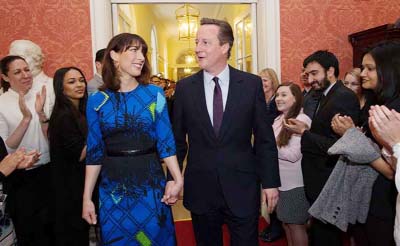
AFP, London :Britain’s Prime Minister David Cameron was due to sketch out his new government today after returning to power in a stunning election victory that toppled his three main rivals.Defying the opinion polls, Cameron’s Conservatives won 331 of the 650 seats in parliament, giving him a second term in office – this time with a majority for his centre-right party. After what had been derided as a flat election campaign, the final twist on polling day Thursday triggered shock results for all the major parties.There were dramatic gains for the Conservatives and the secessionist Scottish National Party (SNP), while the Labour opposition and Liberal Democrat leaders quit over their parties’ electoral drubbing.The UK Independence Party (UKIP) leader also quit, after a huge swell in support for the populist party secured only one seat.In their first editions since the full election result, British newspapers today that Cameron had pulled of a triumphant victory thanks to a surge in support from so-called shy Conservatives.However, they also warned he now faced a tough battle to keep Scotland in the United Kingdom and Britain in the European Union.The election exposed deep divisions on these issues and Cameron avoided triumphalism in his victory speech, promising to “bring our country together”.On returning to the prime minister’s 10 Downing Street office, he pledged to press on with a renegotiation of Britain’s relationship with the EU then hold an in-or-out referendum on the outcome, by the end of 2017.Cameron mulls cabinet jobsCameron has kept his top four ministers in place and boosted the nominal power of his finance minister George Osborne, but was to spend the weekend drawing up names for the remaining ministries in a rejigged administration.He is expected to take until Monday to complete his cabinet fully, then finalise more junior ministerial posts over the coming week.Cameron signalled continuity by reappointing the same finance, foreign, defence and interior ministers from his outgoing cabinet – Osborne, Philip Hammond, Michael Fallon and Theresa May respectively.Cameron also made Chancellor of the Exchequer Osborne the “first secretary of state” – an honorific title that implies seniority over all other ministers and effectively makes him his number two.During the election campaign, Cameron named Osborne, May and London Mayor Boris Johnson as his chief possible successors after previously pledging this would be his final term in office.Johnson’s still has a year to run as mayor, but he secured a seat in parliament. Commentators have speculated on whether Cameron might give him a sinecure role to get him round the cabinet table.The election victory is an endorsement of the Conservatives’ austerity programme and is likely to see a continuation of cuts to public spending as they seek to reduce a budget deficit of nearly $140 billion.

